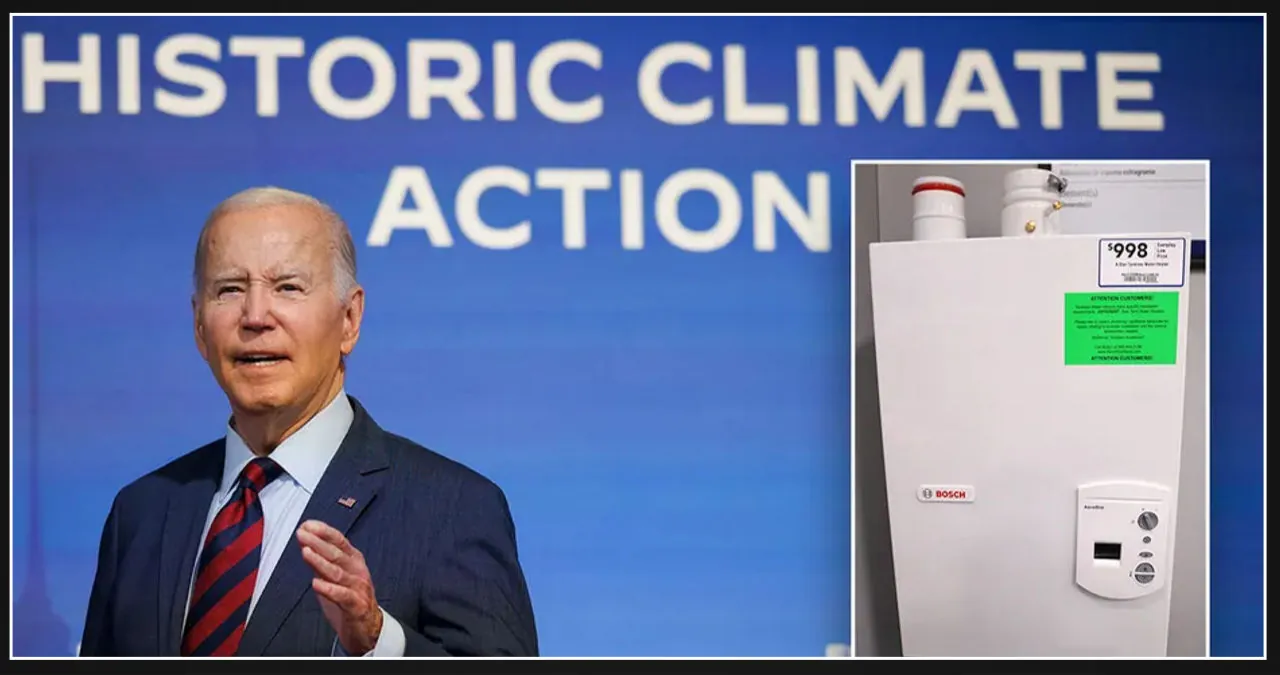Marc Morano, Executive Editor of Climate Depot, shares his thoughts on the recent Senate hearing discussing climate concerns and expresses his views on the Biden administration’s latest climate initiatives in an interview on ‘The Bottom Line’.
The Biden administration’s climate change agenda includes a ban on specific natural gas water heaters, a decision that has drawn criticism for potentially increasing energy costs for low-income and senior households.
In an effort to decrease carbon dioxide emissions and combat global warming, climate change advocates and President Biden are taking action to remove non-condensing, natural gas-fired water heaters from shelves by 2029. This move, made in the final days of the administration, aims to promote more energy-efficient alternatives.
Tankless gas water heaters will be required to use approximately 13% less energy than the least efficient models currently available under the new regulations.
The Biden administration’s climate change agenda includes a ban on specific natural gas water heaters, a decision that has drawn criticism for potentially increasing energy costs for low-income and senior households.
The US Chamber of Commerce and an oil group have filed a lawsuit against the state of Vermont over a law that mandates companies to bear the costs of climate change damage.
The new rules apply to both non-condensing and condensing gas water heaters. However, these rules raise the efficiency requirements to a level that only condensing models can meet. As a result, the cheaper but less efficient non-condensing models will effectively be banned. The reason behind this is that condensing technology is able to waste less heat, making it more energy efficient.
Consumers will have no choice but to purchase either more costly models or less efficient non-instantaneous storage tank water heaters as a result of the DOE’s ban on the currently available models.
According to Diana Furchtgott-Ruth, director of the Center for Energy, Climate, and Environment, tankless technology is commonly employed in situations where space is limited, such as in apartment buildings and smaller homes (The Daily Signal).
Rinnai America stands out as the sole manufacturer of tankless water heaters within the United States. A prime example of their product is the tankless, non-condensing natural gas water heater, which is available at Home Depot for approximately $1,000. In contrast, a condensing 75-gallon tank is priced at $1,800.
The Department of Energy (DOE) quietly published the new rules on the day after Christmas, without making a public announcement. Fox Business has contacted the DOE for comment.
President Biden gave a speech on July 27, 2023, addressing the severe heat conditions.
Shell, the oil giant, has emerged victorious in a significant legal battle against climate activists. In a landmark case surrounding carbon emissions, the company successfully appealed against the activists.
Matthew Agen, who serves as the chief counsel for energy at the American Gas Association, strongly criticized the decision, describing it as “deeply concerning and irresponsible.”
“The Energy Policy and Conservation Act (EPCA) strictly forbids the Department of Energy (DOE) from implementing any regulations that would essentially make a product with a unique performance feature unavailable,” Agen emphasized in a statement prior to the official publication of the rules.
According to Agen, the DOE’s analysis suggests that the average life-cycle cost savings would only be around $112 over the span of 20 years, which Agen deems as insufficient. He argues that the rule lacks justification both legally and practically.
“It is deeply disappointing that the DOE has chosen to move forward with a flawed final rule, which particularly impacts low-income and senior customers by forcing them to pay significantly higher upfront costs.”
Rinnai has recently invested $70 million in the construction of a state-of-the-art factory in Georgia. Spanning over 360,000 square feet, this facility is dedicated to manufacturing non-condensing gas water heaters specifically for the American market. This move by Rinnai demonstrates their commitment to meeting the growing demand for high-quality water heating solutions in the United States.
According to Frank Windsor, the president of Rinnai America, he expressed his disapproval of the move, stating that it is a “bad deal.”
The construction was undertaken by the company in 2020 following President Trump’s initiatives to enhance American manufacturing. As a result, hundreds of individuals are employed by the company.
Windsor expressed his concerns about the upcoming rule, stating that once it is implemented, all the manufacturing efforts will become obsolete. He further added that the significant investments made in equipment will essentially go to waste and will have to be discarded.
People around the world are taking a stand for climate change, holding placards and posters to make their voices heard. (iStock / iStock)
Get Fox Business on the go by clicking here
The nonprofit organization, Appliance Standards Awareness Project (ASAP), has welcomed the move, stating that it will lead to the elimination of 32 million metric tons of carbon dioxide emissions from water heaters sold over a span of 30 years.
The group, which advocates for reducing energy and water usage in appliances, states that it supported the efficiency standards set by the DOE.
Andrew deLaski, the executive director of the ASAP, believes that implementing this simple measure will not only decrease the overall expenses for households but also contribute towards the reduction of harmful emissions that are causing climate change.
“These long-awaited standards will finally allow more families to save money by utilizing energy-efficient technology that is already widely used in the majority of tankless units.”







Leave a Reply